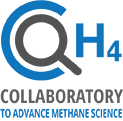AI Software Under Development Aims to Drive Reduction of Methane Emissions in Oil and Gas Operations
The Collaboratory to Advance Methane Science (CAMS) awards funding to the National Center for Atmospheric Research (NCAR) to develop open-source software to deliver more accurate and reliable methane sensing data
07/17/23 Des Plaines, IL
Today, the Collaboratory to Advance Methane Science (CAMS), a research consortium administered by GTI Energy with leading energy companies, announced a $532,000 award to the National Center for Atmospheric Research (NCAR) to develop an open-source, artificial intelligence based software using machine learning (ML) to better locate and quantify methane emissions at upstream and midstream oil and gas facilities using fixed point sensors.
The Source Emission Accounting & Localization System (SEALS) project is led by Dr. Jeremy Sauer from NCAR’s Research Applications Laboratory, in partnership with NCAR’s Computational and Information Systems Laboratory, the Energy Institute of Colorado State University (CSU), and the Planetary Science Institute (PSI). The project combines NCAR’s cutting-edge capabilities in high-performance atmospheric boundary-layer modeling and emerging ML techniques, CSU’s in-depth oil and gas facility and sensor evaluation subject matter expertise, and PSI’s experience in applying ML to methane emissions quantification.
The research team will develop software that uses new ML models, and train and test them using a broader range of simulated climatology and environmental conditions. The team will leverage CSU’s Mechanistic Air Emissions Simulator (MAES) to characterize typical emissions signatures, and explicitly model dispersion impacts of oil and gas infrastructure.
The SEALS project is a novel approach to addressing a technology gap in bottom-up methane emissions characterization by providing operators, regulators, and the research community with an open-source software package that advances the goal of more accurate and reliable methane emissions estimations in the oil and gas industry. The model will also improve the effectiveness of continuous methane sensing data and help drive reduction of fugitive emissions in oil and gas operations.
About the Collaboratory to Advance Methane Science
CAMS is an industry-led collaborative research consortium working to advance methane-related science to better understand global methane emissions and the need for additional solutions. CAMS pursues scientific studies addressing methane emissions from all sectors along the entire natural gas value chain, from production to end use, in basins across the country. Studies will focus on detection, measurement, and quantification of methane emissions with the goal of finding opportunities for reduction.
About GTI Energy
GTI Energy is a leading technology development organization. Our trusted team works to scale impactful solutions that shape energy transitions by leveraging gases, liquids, infrastructure, and efficiency. We embrace systems thinking, innovation, and collaboration to develop, scale, and deploy the technologies needed for low-carbon, low-cost energy systems.

